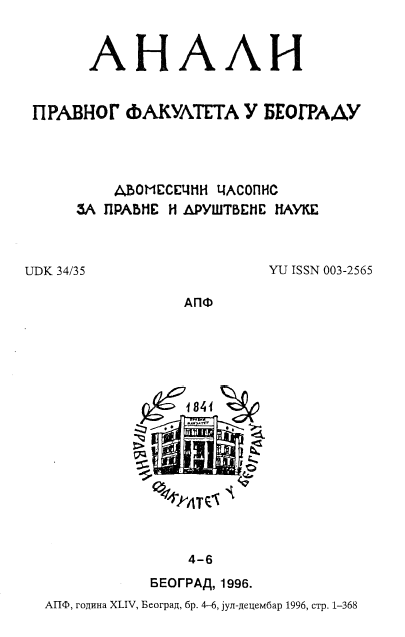ЗАКОН УРСОНЕ
THE LAW OF URSONE
Author(s): Antun MalenicaSubject(s): Roman law
Published by: Правни факултет Универзитета у Београду
Keywords: City statute; Public law; Local autonomy; Population structure; City income; Power organization; Justice; Legal proceeding; Municipal regulations
Summary/Abstract: The author deliberates upon the subject of the Law (statute) of Ursone, the city of which was attached to the cities-colonies of the Roman citizens by Gaius Julius Caesar in 44 B.C. After briefly reviewing the contents and systematics of the Law, the author points to the fact that the statute contains only public law, exclusively the provisions regulating relations in Ursone. On the ground of the aforementioned, the author draws three conclusions, as follows: 1) That the division of law into public and private, discoursed upon by the classical jurist Ulpianus, has been crystallized already in the period of the Republic and that it has been observed in legislative practice, although the post-classical codifications do not point to the fact, including herein Justinian codification as well. 2) That within the public law corpus jurists distinguished between general rules of law and local communities public law. 3) That Romans have regulated the position of colonies in their provinces in a very systematic way, consequently producing laws and municipal statutes in the, even todays, true sense of the word. Through the analysis of the preserved provisions of the Law the author conveys the picture of the colony social structure, its income, organization of power, legal proceedings and municipal matters. In reference to the power organization, the author finds that it has been established in the spirit of the Roman constitutional tradition of the period of the Republic, meaning that, contrary to Rome, where one man has been the holder of power from Caesar thereafter, provincial colonies and municipalities have been governed by local aristocracy during the principale period. It is the author’s opinion that this formula, according to which central power is held by an individual whereas local power is held by aristocracy, has provided several centuries of prosperity throughout the vast Empire areas. By analyzing colony law, the author explains the difference between the Roman and contemporary perceptions of public law, emphatically setting forth that owing to that difference modem categories, such as, for instance, criminal law and criminal act, should not be sought after in such laws.
Journal: Анали Правног факултета у Београду
- Issue Year: 44/1996
- Issue No: 4-6
- Page Range: 3-34
- Page Count: 32
- Language: Serbian

